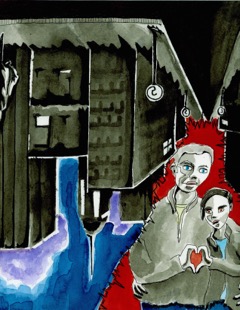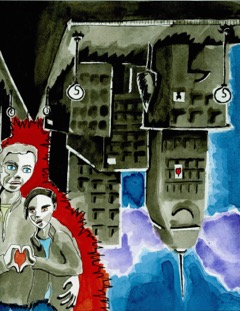FREDS,
After learning from a friend about its evocative 80s soundtrack, I went ahead and watched a show called ’13 Reasons Why’ (out on Netflix now). The show is set in the present & I couldn’t wait to see what kind of drama would play out to the very songs that accompanied me through my own troubled youth.
I had no idea what I was getting into. The show was captivating right from the start—all character driven & narrated (on cassette tape!) by a girl who had recently killed herself. As compelling as it was, I kept expecting this all-too-human storyline to morph into something with vampires or zombies or cannibals or some idiotic supernatural (angels? fairies, maybe?) premise which would ruin the believable intensity. I absolutely hate the vampirization/zombification/superheroicazation of every fucking thing these days.
But this story did not turn into vampires & zombies, oh my.
It stuck to being uncomfortably human to the point where I was thinking—Okay, they can bring in the angels any time.
*******WHY THE SHOW WAS EFFECTIVE******
The show was effective for several reasons. The writing was honest. It wasn’t trying to impress by being too clipped & cool & “whatevs.” A lot of things written for the young adult gaze are just so, you know, Tumblr-y. Social networking was hinted at here, but it was a background character, lurking ominously behind real life. As it should in the televisionary medium.
It didn’t underestimate the intelligence of young people, or diminish the complexity of their emotions. Or gloss over what it’s really like to interact w/ the vampiric hormones & uncooked frontal lobes that swarm through high school hallways.
The haunting quality of the dead girl’s voice-over really gets under your skin, into your psyche, no matter what your age, gender, or level of disenchantment with the world. It’s one of those shows that makes you feel rather than think. Which is unusual these days.
Not too long ago, I wrote extensively about my formative years right here in this Octopus Diary. When I did, I was writing from a safe distance, a detached narration, here’s what happened to me…blah, blah, blah…I didn’t let myself get too involved in my own feelings about what had happened, I was just telling it, to myself and to you, my witnesses.
But this show, with its brutal, accusatory narration, really transported me back to my Senior year in high school in a way that writing about it did not.
[Brief recap: my senior year was riddled with very adult situations that were way out of my league. I found myself in a very controlling, abusive relationship that I couldn’t get myself out of, and I didn’t know how to ask for help. I was hit, punched, burned w/ cigarettes, stabbed with scissors, drugged (not with roofies, but LSD), sexually assaulted, and finally held at gunpoint for hours when I tried to break up with this troubled boy; this boy I had wanted to be an ally to, this boy I had wanted to help, this boy I had looked up to.
My reputation was slandered, my social skills suffered, I was basically traumatized for years afterward, and became “that weird person no one likes” (and I sometimes still slip into that role, even now.)]
Watching this show brought the devastation of all that back to me on a visceral level. Watching other kids go through a modern day version of that was actually re-traumatizing. I mean, I laugh at trigger warnings, because, really? But I could’ve used a trigger warning before this show!
So this is not something to just let your teens or young adults look at without discussion. And for my friends with kids that age, just know that this stuff happens, can happen right under your nose without you having a clue. My parents had no idea that many of my injuries & problems were stemming from a mad, crazy relationship just like the kids in this show carried on & tried to handle their own drama without seeking adult intervention.
Until it was too late.
*******WHY THE SHOW WAS PROBLEMATIC*********
Okay, so it was well-written, haunting, honest and realistic on one level, but I could hear all you social justice warriors in my head too.
This show probably wouldn’t have worked so effectively if the narrator had not been a beautiful white girl.
There were plenty of other characters getting “beat up” by life, and by each other. One girl, of mixed race, was raped while she was passed out at a party.
One girl, black, gets into serious legal trouble when she runs over a stop sign after a night of partying, and another student is killed as a result.
Another girl, Asian, was outed as a lesbian after the white girl’s stalker caught them kissing experimentally with his intrusive camera—
—why do movies & shows always need cameras & peeping Toms to give us that 3rd party angle?—
Any of those scenarios would be enough to make one suicidal, but would we care as much if our protagonist were black or Asian or Muslim or a transgirl? Why not?
And let’s not forget the boys here—the boys were being bullied & physically beat up, fighting each other, bleeding from their faces at a much higher rate, but hey, they’re boys and they can handle it, right? That’s just what boys do, right?
The boyfriend of the passed-out drunk girl was bullied and pushed to the floor by his big rich jock friend, who said “what’s mine is yours” as he proceeded to rape her. The smaller boy looked distraught that he could not protect her, or stop his friend’s selfish, criminal actions.
Another boy, a close friend of the dead narrator’s, ends up taking his own life a few weeks after she does. I think this was meant to show that ‘suicide begets suicide.’ That kids will follow one another to the grave if the grief is too much to bear. Which is true. But his death was glossed over compared to all the fanfare given the beautiful girl no one suspected was suffering.
Not to mention the boy who died in the car accident after the STOP sign was knocked over! He was just brushed under the rug like a one-dimensional prop. He was not a main character, but his death seemed to have such little impact on the school, and on the story itself. So wrong.
I had mixed feelings about the indicting tone on those cassette tapes too. First I was like—Yeah! You tell’em, girl! But then as I saw how much shit was going on in everyone else’s life I just thought…
… damn girl, you’re just not …a survivor. You’re one of the ones who didn’t make it.
Okay…I think that’s all I will say about ’13 Reasons Why.’ I’m still a little disconcerted & it’s been over a week since I watched it. I will repeat this though—parents of teens, please know that all this can go on without a lot of obvious signs. Dig deep, keep your eyes wide, don’t be in denial & think ‘It can’t happen to my kid because s/he is a good student, or I raised him/her better than that.’ Kids are kids are humans are capable of just about anything…
*********13 Reasons Why The Octopus Diary Will Be Taking Submissions************
1. Because it’s the dawning of the Age of Aquarium
2. Because Russia is waiting
3. Because the sky could turn orange any day
4. Because your brain is a microwave (it is—look into it)
5. Because words speak louder than actions
6. Because all tired old platitudes must be rewritten
7. Because I need the experience
8. Because you need the experience
9. Because 9 tentacles are not better than 8
10. Because this is the place to be seen & heard (scene & herd)
11. Because it’s for a good cause—Polycythemia Awareness & Prevention
12. Because all proceeds go to post nuclear clean-up and dandelion farming
13. Because I need you to be creative while I go through an Era of Seriousness
TaTa for now. I’ll have submission guidelines and new art—actually new versions of Tiptree art—for you next time. Be well, Fred.







